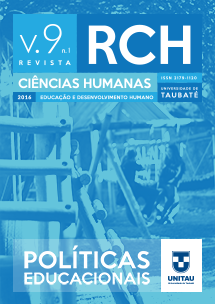DE UM PONTO DE VISTA: COMO SE APRENDE OU NÃO GRAMÁTICA NA ESCOLA
DOI:
https://doi.org/10.32813/2179-1120.2016.v9.n1.a306Palavras-chave:
Palavras-Chave, Língua Portuguesa, Gramática, Aprendizado.Resumo
Avaliando os desafios que a escola tem passado, ao ensinar a língua portuguesa aos alunos, de modo que eles saibam como usar as palavras de maneira adequada, e sejam capazes não apenas de interpretar textos, mas escrever com perfeição. Torna-se relevante pesquisar sobre até que ponto a gramática se torna um fator essencial de ser aprendido na escola. Existem muitos estudos que diferem em opiniões em relação ao assunto. Mas esse artigo tem como objetivo demonstrar que a própria escola passa por desafios na compreensão do que é prioritário ensinar e como transmitir aos alunos características da língua portuguesa que venham de encontro a uma escrita perfeita. Para realização desse assunto, utilizei-me de pesquisa bibliográfica, buscando em diferentes autores, informações que viessem de encontro ao objetivo desse estudo.
Métricas
Referências
BRASIL. Ministério da Educação. Parâmetros curriculares nacionais: ensino médio. / Secretaria de Educação Média e Tecnológica. Brasília: Ministério da Educação, 1999.
CANZIANI, Tatiana de Medeiros. O letramento no ensino de língua portuguesa: estratégias para a formação do cidadão. (2009)
KOCH, Ingedore Grunfeld Villaça. Desvendando os segredos do texto. São Pauo: Cortez, 2002.
LERNER, Délia. Ler e Escrever na escola: o real, o possível e o necessário. Porto Alegre: Artmed. 2002.
LUFT, P. C. Língua & Liberdade: por uma nova concepção da língua materna. 8. ed. São Paulo: Ática, 2003.
MARCUSCHI, Luiz Antônio. Da fala para a escrita: atividades de retextualização. São Paulo: Cortez, 2005.
NEVES, Maria Helena de Moura. A gramática: história, teoria e análise, ensino. São Paulo: UNESP, 2002.
PERINI, Mário A. Gramática descritiva do português. São Paulo: Ática, 2005.
SANTOS, Janete. Letramento, variação linguística e ensino de português. Linguagem em (Dis)curso - LemD, Tubarão, v. 5, n.1, p. 119-134, jul./dez. 2004.
TFOUNI, Leda Verdiani. Letramento e alfabetização. São Paulo: Cortez, 2004.
WOERMANN, Minka. Interpreting Foucault: an evaluation of a Foucauldian critique of education. S. Afr. j. educ., Pretoria, v. 32, n. 1, 2012 .
Downloads
Publicado
Como Citar
Edição
Seção
Licença
As publicações da Revista Ciências Humanas estão registradas sob a licença Creative Commons Attribution CC-BY.
1. Os conteúdos dos trabalhos são de exclusiva responsabilidade de seu autor.
2. É permitida a reprodução total ou parcial dos trabalhos publicados na Revista, desde que citada a fonte.
3. Ao submeterem seus trabalhos à Revista os autores certificam que os mesmos são de autoria própria e inéditos (não publicados em qualquer meio digital ou impresso).
4. Os direitos autorais dos artigos publicados na Revista são do autor, com direitos de primeira publicação reservados para este periódico.
5. Para fins de divulgação, a Revista poderá replicar os trabalhos publicados nesta revista em outros meios de comunicação como, por exemplo, redes sociais (Facebook, Academia.Edu, etc).
6. A Revista é de acesso público, portanto, os autores que submetem trabalhos concordam que os mesmos são de uso gratuito.
7. Constatando qualquer ilegalidade, fraude, ou outra atitude que coloque em dúvida a lisura da publicação, em especial a prática de plágio, o trabalho estará automaticamente rejeitado.
8. Caso o trabalho já tenha sido publicado, será imediatamente retirado da base da revista, sendo proibida sua posterior citação vinculada a ela e, no número seguinte em que ocorreu a publicação, será comunicado o cancelamento da referida publicação. Em caso de deflagração do procedimento para a retratação do trabalho, os autores serão previamente informados, sendo-lhe garantido o direito à ampla defesa.
9. Os dados pessoais fornecidos pelos autores serão utilizados exclusivamente para os serviços prestados por essa publicação, não sendo disponibilizados para outras finalidades ou a terceiros.





